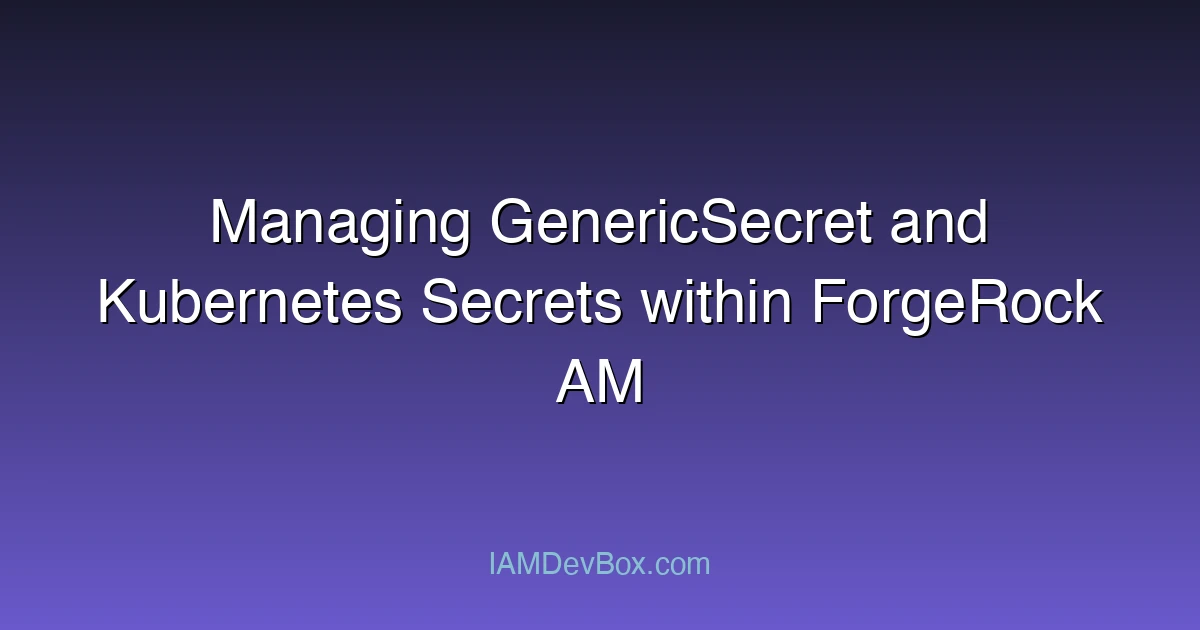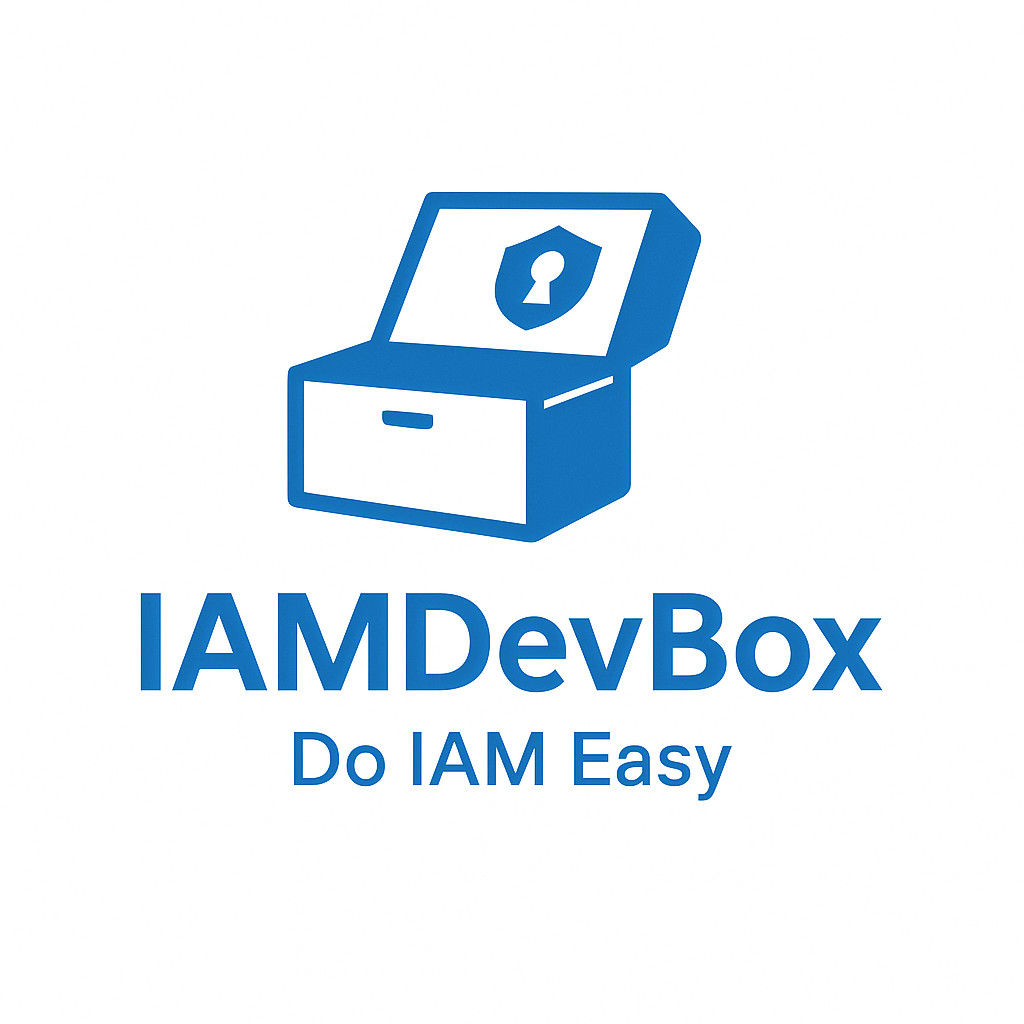In the realm of identity management, securing sensitive information is paramount. ForgeRock Access Management (AM) is a leading solution for managing user access and authentication, and it integrates seamlessly with Kubernetes to handle secrets securely. This blog post explores how to manage GenericSecret and Kubernetes Secrets within ForgeRock AM, providing actionable insights and practical examples.
Visual Overview:
graph TB
subgraph "Kubernetes Cluster"
subgraph "Control Plane"
API[API Server]
ETCD[(etcd)]
Scheduler[Scheduler]
Controller[Controller Manager]
end
subgraph "Worker Nodes"
Pod1[Pod]
Pod2[Pod]
Pod3[Pod]
end
API --> ETCD
API --> Scheduler
API --> Controller
API --> Pod1
API --> Pod2
API --> Pod3
end
style API fill:#667eea,color:#fff
style ETCD fill:#764ba2,color:#fff
Understanding Kubernetes Secrets
Kubernetes Secrets are a fundamental resource in Kubernetes for storing sensitive information such as passwords, tokens, and certificates. They are designed to be accessed by pods and other Kubernetes resources, ensuring that sensitive data is not exposed in plain text.
Types of Kubernetes Secrets
- Opaque Secrets: These are base64-encoded strings and are the most common type.
- TLS Secrets: Used for storing certificates and private keys for TLS encryption.
- Dockercfg Secrets: Used for storing Docker credentials.
Creating a Kubernetes Secret
Here’s an example of creating an opaque Kubernetes Secret:
apiVersion: v1
kind: Secret
metadata:
name: my-secret
type: Opaque
data:
username: dXNlcm5hbWU= # base64 encoded value
password: cGFzczMxMjQ= # base64 encoded value
This Secret can then be mounted as a volume in a pod or accessed via environment variables.
Introduction to ForgeRock AM and GenericSecret
ForgeRock AM is a comprehensive identity management solution that provides robust authentication and authorization mechanisms. The GenericSecret resource is a custom resource definition (CRD) designed to manage secrets in a Kubernetes environment, integrating closely with ForgeRock AM.
Why Use GenericSecret?
- Centralized Secret Management:
GenericSecretprovides a centralized way to manage secrets across different environments. - Integration with ForgeRock AM: It seamlessly integrates with ForgeRock AM, enabling secure access to sensitive information.
- Enhanced Security: Built-in encryption and access controls ensure that secrets are protected at rest and in transit.
Configuring GenericSecret in ForgeRock AM
To configure GenericSecret in ForgeRock AM, you need to define the resource and integrate it with your Kubernetes cluster.
Step 1: Define the GenericSecret Resource
Here’s an example of a GenericSecret resource:
apiVersion: am.forgeRock.io/v1alpha1
kind: GenericSecret
metadata:
name: example-generic-secret
spec:
type: Opaque
data:
db-username: dXNlcm5hbWU=
db-password: cGFzczEyMzQ=
secretRef:
name: my-database-secret
namespace: default
This resource defines a GenericSecret that references a Kubernetes Secret named my-database-secret.
Step 2: Integrate with ForgeRock AM
ForgeRock AM can be configured to use GenericSecret for authentication and authorization. Here’s an example of how to configure it:
apiVersion: am.forgeRock.io/v1alpha1
kind: AccessManagement
metadata:
name: example-am
spec:
secretManagement:
enabled: true
genericSecretRef:
name: example-generic-secret
namespace: default
This configuration enables secret management in ForgeRock AM and references the GenericSecret resource.
Best Practices for Managing Secrets
- Use Strong Encryption: Always encrypt sensitive data at rest and in transit.
- Limit Access: Use role-based access control (RBAC) to restrict access to secrets.
- Rotate Secrets Regularly: Implement a rotation policy to minimize the risk of compromised secrets.
- Audit and Monitor: Regularly audit and monitor secret usage to detect anomalies.
Text-Based Diagram: Secret Management Workflow
+-------------------+ +-------------------+ +-------------------+
| Application | | ForgeRock AM | | Kubernetes |
| | | | | Secrets |
| |<----->| |<----->| |
+-------------------+ +-------------------+ +-------------------+
This diagram illustrates the workflow for managing secrets in a Kubernetes environment with ForgeRock AM.
🎯 Key Takeaways
- Centralized Secret Management
- Integration with ForgeRock AM
- Enhanced Security
Conclusion
Managing secrets securely is a critical aspect of any Kubernetes-based application, especially when dealing with sensitive data. By leveraging GenericSecret and Kubernetes Secrets within ForgeRock AM, you can ensure that your secrets are managed securely and efficiently.
SEO Tags
- ForgeRock AM
- Kubernetes Secrets
- Identity Management
- Security Best Practices
- GenericSecret
FAQ
What is the role of GenericSecret in ForgeRock AM?
GenericSecretprovides a centralized and secure way to manage secrets within ForgeRock AM, ensuring seamless integration with Kubernetes.How do Kubernetes Secrets integrate with ForgeRock AM? Kubernetes Secrets can be referenced and managed through
GenericSecret, enabling secure access to sensitive information.What are the best practices for securing secrets in a Kubernetes environment? Use strong encryption, limit access with RBAC, rotate secrets regularly, and audit and monitor secret usage.
This concludes our exploration of managing GenericSecret and Kubernetes Secrets within ForgeRock AM. By following these best practices, you can enhance the security of your identity management solution.

